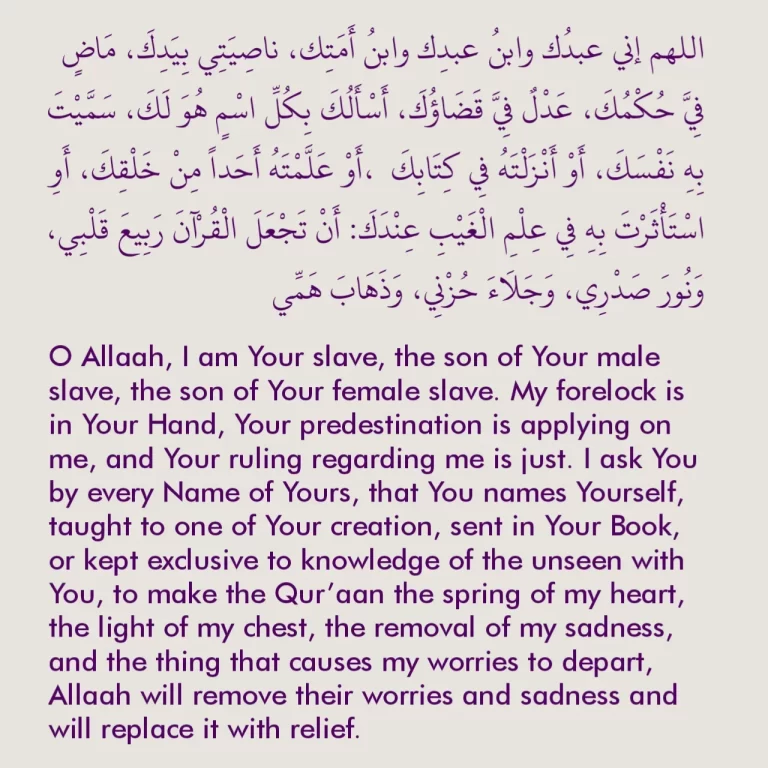Allahumma Inni As Aluka Ilman Nafian Meaning, Arabic Text, And Benefits
Allahumma inni as aluka ilman nafian is a dua which our beloved Prophet Muhammad (SAW) used to recite after the Fajr prayer.
Advertisements
Find out the meaning, benefits and simple explanation of this wonderful supplication.
Allahumma Inni As Aluka Ilman Nafian Meaning
The meaning of allahumma inni is O Allah, I ask You for beneficial knowledge, goodly provision, and acceptable deeds.
Allahumma Inni As Aluka Ilman Full Dua In Arabic
اللَّهُمَّ إِنِّي أَسْأَلُكَ عِلْمًا نَافِعًا وَرِزْقًا طَيِّبًا وَعَمَلاً مُتَقَبَّلاً
Transliteration/ Pronounciation
Allahumma inni as’aluka ilman naafi’an, wa rizqan tayyiban, wa ‘amalan mutaqabbalan.
Advertisements
Allahumma Inni As Aluka Ilman Nafian Hadith
It was narrated from Umm Salamah that when the Prophet (SAW) performed the Subh (morning prayer), while he said the Salam, he would say:
Allahumma inni as’aluka ‘ilman nafi’an, wa rizqan tayyiban, wa ‘amalan mutaqabbalan (O Allah, I ask You for beneficial knowledge, goodly provision and acceptable deeds).
Sunan Ibn Majah 925

RELATED POSTS:
- Allahumma Akfini Him Bima Shita Arabic And Meaning
- Allahumma Zidna Wala Tanqusna Wa Akrimna
- Allahumma Izzal Islama Wal Muslimeen Full Meaning
The Prophet’s Dua for Blessings in 3 Key Aspects of Life
This beautiful dua reported from the Prophet Muhammad (peace be upon him) encompasses three essential aspects of life: knowledge, provision, and good deeds.
1. Beneficial Knowledge (Ilm):
- Knowledge is a light that dispels ignorance and confusion.
- The Prophet’s dua highlights the importance of seeking beneficial knowledge.
- By asking Allah for knowledge, you’re seeking understanding and wisdom to navigate life.
2. Goodly Provision (Rizq):
- Provision refers to sustenance, not just material wealth.
- Seeking goodly provision means asking for sustenance that is halal (permissible) and blessed.
- It’s a reminder that Allah is the ultimate provider, and our sustenance is in His hands.
3. Acceptable Deeds (Amal Salih):
Advertisements
- Good deeds are the building blocks of a righteous life.
- This part of the dua emphasizes the importance of having our actions accepted by Allah.
- It’s a reminder that intentions and sincerity matter in all our actions.

Brief Commentary
- The Prophet (SallaAllahu ‘alayhi wasallam) used to say this supplication in the morning, soon after completing the Fajr prayer.
- The Prophet (SallaAllahu ‘alayhi wasallam) teaches us in this hadith to ask Allah for beneficial knowledge. From this, it is inferred that not all knowledge is beneficial.
- Beneficial knowledge is the knowledge that increases the awe of Allah in a person’s heart, and pushes him to increase in righteous actions.
- Allah says in the Qur’an {From His servants, it is only the scholars that fear Allah} therefore those who have acquired beneficial knowledge are the ones who truly fear Allah.
- The second thing that is asked for in this hadith is good provision. Good provision is that which is halal and pleasing to Allah.
- Haram income is something that is detrimental to a person’s life and hereafter, and is a cause for non-acceptance of du’aa.
- Good provision is not limited to financial income, but also includes anything that brings a person closer to Allah, such as recitation of the Qur’an with concentration, remembrance of Allah with a present heart, the increase of a person’s Iman, a pious spouse and offspring, etc.
- The final thing that is asked for in this hadith is acceptance of good deeds. We understand from this that not every good deed we do is automatically accepted by Allah.
- The great Sahabi Abu Al-Dardaa’ would say, “For me to be certain that Allah has accepted one of my Salah is more beloved to me than the dunya and what is in it”.
- Imam Ibn Kathir said, “Acceptable actions must fulfil two conditions; they must be sincere for the sake of Allah, and must be in accordance with the shari’ah”.
Benefits
The dua reported from the Prophet Muhammad (peace be upon him) carries several benefits for those who recite it sincerely. Here are some of its benefits:
- Guidance: By asking for beneficial knowledge, this dua helps you seek guidance and wisdom in your life’s decisions. It can lead you towards a path of understanding and discernment.
- Blessed Sustenance: Requesting goodly provision reminds you that Allah is the ultimate provider. It can help you appreciate the blessings in your life and encourage you to earn your sustenance in a halal (permissible) and ethical way.
- Righteous Actions: Praying for acceptable deeds encourages self-reflection and self-improvement. It prompts you to strive for sincerity in your actions, ensuring they are in line with Allah’s pleasure.
- Spiritual Connection: Reciting this dua strengthens your connection with Allah. It reminds you of your dependence on Him for knowledge, sustenance, and the acceptability of your actions.
- Enhanced Decision-Making: By seeking beneficial knowledge, you are better equipped to make informed and wise decisions, both in your personal and professional life.
- Contentment: Understanding that Allah is the provider of goodly sustenance can bring contentment and tranquility to your heart, reducing anxiety about material wealth.
- Purification of Intentions: This dua encourages you to purify your intentions in all your actions, making them solely for the sake of Allah. This can lead to personal growth and a more fulfilling spiritual life.
- Protection from Harm: By asking for beneficial knowledge, you seek protection from ignorance and misguided choices that can harm you in this world and the hereafter.
- Barakah (Blessings): The act of regularly reciting this dua can bring blessings into your life and the various aspects of it, including your knowledge, sustenance, and deeds.
- Increased Taqwa (God-consciousness): Regularly reciting this dua fosters an awareness of Allah’s presence in your life, promoting taqwa (God-consciousness) and mindfulness in your daily activities.
- Dua’s Acceptance: Making this dua sincerely is an act of worship. Allah loves to respond to the supplications of His servants, and He may grant your requests.
- Life of Purpose: The dua encourages you to focus on a life of purpose, with a quest for knowledge, ethical sustenance, and righteous deeds, leading to a more meaningful and fulfilling existence.
Incorporating this dua into your daily life can have a profound impact on your spirituality, mindset, and overall well-being.
It’s a powerful reminder of the core values and principles that should guide a believer’s life.
Advertisements

Points To Consider
- A person who studies this religion should ask himself what effects the studies have had on his relationship with Allah and on his actions. Shaykh Ibn Uthaymeen said, “How many laypeople you see they have awe of Allah, consciousness of Allah, good manners and righteous worship that far surpass what a student of knowledge has”.
- Ensure you seek knowledge for the sake of Allah and act upon what you learn. Knowledge is studied to increase in righteous actions, not for academic pleasures, or even worse, to seek a part of this dunya.
- Beneficial knowledge was mentioned first as it is what allows a person to ensure they have good provisions, and acceptable deeds.
- Ensure your income is halal and any transactions you make are halal so that you can be from those who have good provision.
- Ensure you study the religion properly so that you can perform actions which are in accordance with the shari’ah, and ensure you perform them sincerely for the sake of Allah so that they may be accepted.
Conclusion
The dua reported from the Prophet Muhammad (peace be upon him) encapsulates the essence of a successful and fulfilling life.
By seeking beneficial knowledge, goodly provision, and acceptable deeds, we strive for a life that is guided by wisdom, blessed with sustenance, and filled with righteous actions.
This dua serves as a reminder of the importance of these three core aspects of our journey in this world.
Advertisements








4 Comments